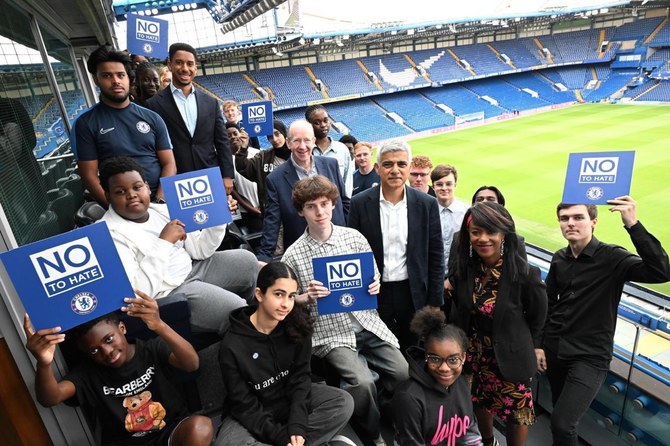LONDON: London Mayor Sadiq Khan has revealed that he is “not safe” as a Muslim politician in the UK after far-right riots engulfed the country this week.
He said rhetoric from politicians has led to a “heartbreaking” return of bigotry in Britain, and called on the government to introducer harsher legislation to tackle misinformation and hate speech on social media.
“Clearly I’m not safe, which is why I’ve got police protection,” Khan said at an anti-racism event hosted by Chelsea Football Club in London.
Unrest broke out across the UK following a knife attack last week that killed three children. Far-right agitators are thought to have spread false information online wrongly accusing the attacker of being a Muslim asylum-seeker.
This led to mosques, Muslim neighborhoods and businesses, and centers housing asylum-seekers being targeted by mobs.
When asked whether the use of language by MPs from the Reform and Conservative parties had played a part in stoking the violence, Khan said: “I think for the last few years we’ve seen politicians, including from the last government, use language that’s not guarded.”
Earlier this year, Reform Chief Whip Lee Anderson accused Khan of being beholden to “Islamists.”
Former Home Secretary Suella Braverman wrote in the Daily Telegraph: “The truth is that the Islamists, the extremists and the anti-Semites are in charge now.”
This week, Conservative leadership candidate Robert Jenrick said protesters shouting “Allahu Akbar” (God is great) on the streets of the UK should be arrested.
Khan called on Jenrick to withdraw his remarks, and previously said Braverman’s article was “a poisonous attempt to drive a wedge between our communities.”
At the Chelsea event, Khan said: “Talking about an invasion, talking about Islam running the country, talking about Islam running London — this sort of language leads to people believing some of this stuff.
“I think good politicians, positive politicians address people’s fears, poor ones play on people’s fears, and these ones play on people’s fears with tropes and conspiracy theories, and they should reflect on the consequences of that.”
In an interview with The Guardian, he said what the UK had witnessed over the past few days is reminiscent of his childhood in London, when he and others had to contend with racist groups such as the National Front and the British National Party.
“What’s heartbreaking to me is my children’s generation had never experienced what I had, and they, for the first time, were scared,” he said. “I thought I’d be the last generation to be scared, simply for who I am. And it breaks my heart.
“I’m somebody who grew up in the 1970s and 80s and experienced the National Front and the BNP, and I thought that’s behind us.
“Like a lot of people of my generation, I felt triggered by the events of the last couple of weeks in particular.
“It’s difficult to explain the ripples when you’ve been targeted because of your religion or colour of your skin and you can’t change either of those things.”
Khan said the way misinformation has been spread online, including how far-right groups have used social media to organize violence, shows that current legislation requiring companies to take “robust action” against illegal activity is out of date.
“The way the algorithms work, the way that misinformation can spread very quickly and disinformation … that’s a cause to be concerned, we’ve seen a direct consequence of this,” he added.
“I think what the government should do very quickly is check whether the Online Safety Act is fit for purpose; I think it’s not fit for purpose.”
Home Secretary Yvette Cooper has called on social media companies to do more to tackle extremism, while Justice Secretary Heidi Alexander branded X owner Elon Musk as “deeply irresponsible” after the billionaire posted that “civil war is inevitable” in the UK in the wake of the riots.
Cabinet Office Minister Nick Thomas-Symonds said the government will keep the legislative framework for the Online Safety Act “under review.”
He added: “If we need to act in relation to online safety laws — we will. Sadiq Khan’s challenge is that we quickly review it, consider it, and that’s exactly what we will do.”



























